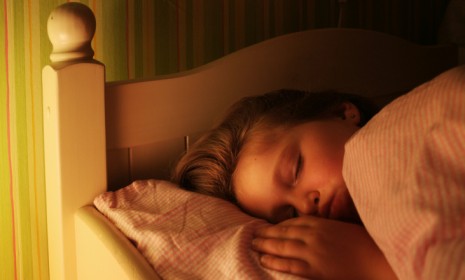Does sleeping with a night-light cause depression?
Researchers from Ohio State University found that chronic after-dark exposure to a dim light — or a TV or computer — can trigger mood disorders

A free daily email with the biggest news stories of the day – and the best features from TheWeek.com
You are now subscribed
Your newsletter sign-up was successful
Still afraid of the dark? It's probably time to get over it. New evidence from Ohio State University found that a dim light at night — whether it comes from a night-light, or staying up late in front of a computer or TV — may be making you depressed. Here's what you should know:
What happened in this study?
University researchers exposed hamsters to a faint light when they went to sleep. Within a few weeks, the animals began to exhibit classic symptoms of depression. The hamsters spurned sugar water (normally, a reliable lure for hamsters) and were more lethargic than peers who slept in complete darkness. They performed poorly on behavior tests. Brain scans revealed changes in the hamsters' hippocampus typically associated with depressed people. "The results we found in hamsters are consistent with what we know about depression in humans," says study author Tracy Bedrosian.
The Week
Escape your echo chamber. Get the facts behind the news, plus analysis from multiple perspectives.

Sign up for The Week's Free Newsletters
From our morning news briefing to a weekly Good News Newsletter, get the best of The Week delivered directly to your inbox.
From our morning news briefing to a weekly Good News Newsletter, get the best of The Week delivered directly to your inbox.
What does artificial light do to the body?
Artificial light disrupts our natural circadian rhythms, which may in turn alter the body's hormone levels. "When people spend too little time in darkness, it seems that the body suppresses release of the hormone melatonin," says Laura Blue at TIME, which is thought to fight a myriad of conditions, including tumor growth and cancers. According to the American Medical Association, interrupting the body's circadian rhythm could also lead to obesity, diabetes, and reproductive problems.
So I should get rid of my night-light?
The team speculates that artificial light may be part of the reason depression rates have soared in recent decades. There is good news, however: When the afflicted hamsters were again allowed to sleep a full eight hours per night in the dark, their depressive symptoms disappeared completely. This offers gloomy night owls some hope, says Bedrosian. "People who stay up late in front of the television and computer may be able to undo some of the harmful effects just by going back to a regular light-dark cycle and minimizing their exposure to artificial light."
A free daily email with the biggest news stories of the day – and the best features from TheWeek.com
Sources: Medical Daily, My Health News Daily, TIME
-
 Political cartoons for February 20
Political cartoons for February 20Cartoons Friday’s political cartoons include just the ice, winter games, and more
-
 Sepsis ‘breakthrough’: the world’s first targeted treatment?
Sepsis ‘breakthrough’: the world’s first targeted treatment?The Explainer New drug could reverse effects of sepsis, rather than trying to treat infection with antibiotics
-
 James Van Der Beek obituary: fresh-faced Dawson’s Creek star
James Van Der Beek obituary: fresh-faced Dawson’s Creek starIn The Spotlight Van Der Beek fronted one of the most successful teen dramas of the 90s – but his Dawson fame proved a double-edged sword